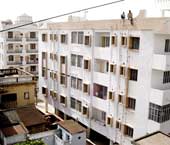 |
| Buyers can heave a sigh of relief as most of the homes in the state cost less than Rs 20 lakh |
Ranchi, April 19: House-hunters in the state can rest easy.
The Reserve Bank of India decision asking banks to be more stringent while sanctioning loans is unlikely to have much of an impact as few houses or flats cost more than Rs 20 lakh.
The RBI had yesterday told banks to increase the provisioning on standard advances for personal loans and residential housing beyond Rs 20 lakh from 0.4 per cent to 1 per cent. This means that banks will scrutinise home loans closely and there is a possibility that applicants might not get the full amount applied for and on the desired terms.
Realtors in the state today sought to allay fears by pointing out that most houses or apartments in Jharkhand cost less than Rs 20 lakh.
Property dealers in Ranchi said even in upmarket areas, houses and flats cost within Rs 15 lakh. ?There is no need for the people of Jharkhand to worry about the decision,? said Rajesh Mishra, president of the Real Estate Developers? Association of Jharkhand.
Chandrakant Raipat, former president of the association, said there has been a boom in real estate in places like Ranchi, Jamshedpur, Bokaro and Dhanbad, but it was no way comparable to that in cities like Mumbai, Delhi, Ahmedabad or even Calcutta.
?There is hardly any house or flat which costs more than Rs 20 lakh in Jharkhand. In Ranchi, flats cost anywhere between Rs 800 and Rs 15,000 per square foot, depending on the locality and quality of construction. In Jamshedpur, the rate varies from Rs 700 to Rs 17,000 per sq. ft. Even upmarket areas in the capital such as Kanke Road, Main Road, Lalpur or Bishtupur in Jamshedpur do not have houses which cost beyond this rate,? Raipat said.
What could impact the property developers is the RBI?s decision to raise the risk weightage for commercial real estate loans (those given to builders) to 150 per cent from 125, which could further restrict the flow of funds into housing.
Raipat said the increase would ?definitely? affect the availability of funds, which in turn will adversely affect the real estate business. This, he added, would also indirectly affect the construction material manufacturing industry. ?Labour component, which constitutes about 33 per cent of the real estate sector, will also be affected,? he said.











